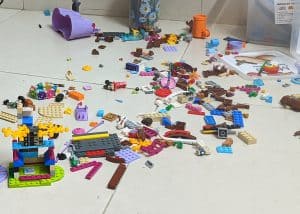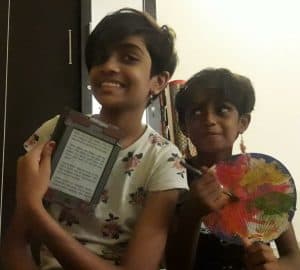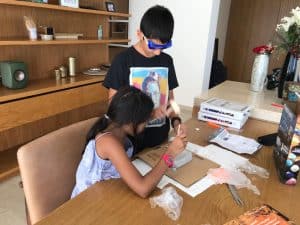With schools across the country forced to suspend classes because of the COVID lockdown, children across the country are now meeting an entirely new set of teachers who help them with their coursework: their desktops, laptops, iPads – and their parents. Classes went online with most schools switching to virtual classrooms, circulating homework via emails and conducting video tutorials. From yoga classes to science lessons, schools in India are gearing up to impart online education for an indefinite period.
Traditionally, Indian parents are used to a routine: getting children ready in the morning, sending them to school, picking them up in the evening and then getting them to complete their homework. This routine is now being challenged with the COVID outbreak which has forced not just children but also parents to work from home.
It is a delicate balancing act with parents juggling their own workloads with the educational needs of their children. Parents are also realising that teaching their children is not as simple as giving them instructions or a to-do list.
So here is an insight into things that stress me. I see all these “online resources” targeted at kids staying home and I feel like I should check each one of them out (and also get my 10-year old to try them)
— Vinitha (@vinitha) March 23, 2020
So how can parents manage this “Emergency Homeschooling”? We turned to the Indian homeschooling community for whom this is the norm. Homeschoolers in India use a wide variety of methods and materials, at par with international norms, and often customized to fit individual learning styles. Though there is no data available, the most prevalent methods in India are Montessori method, Unschooling, Radical Unschooling, Waldorf education and traditional School-at-home. Many homeschoolers follow formal education methods at home through CBSE, NIOS (formerly NOS) and IGCSE. During the year 2017-18, 5,62,222 students were enrolled in NIOS Academic Courses.
Supriya and Arvind who have been homeschooling their daughter, Mithra, 5, for a year now, say “Homeschooling has helped us to connect with our inner self and carefully moderate our words and actions in our everyday life. Our mornings and afternoons are often busy painting, drawing, cooking, reading, and lots of pretend play.”
Homeschooled children thrive on the surroundings they live in. Most children do not follow a specific schedule. In fact the daily chores that are conducted in the family such as doing laundry, cutting vegetables cleaning etc. become a part of the routine.
Has the current lockdown affected them in any way?

Nurturing Creativity
Supriya and Arvind say “Our daughter being around us all the time is normal and in fact we love each other’s company a lot. However, we do miss our trips to the library, playing with friends in the evening, and meeting people. Many often connect homeschooling to staying at home and studying but instead it’s the other way around—where the child is free to explore and learn from every opportunity that comes by”
Ruchi Sharma, mother of 11 year old Ved and 9 year old Arya, is rejoicing in her decision to homeschool her kids. She says, “I have never in my life felt more confident about my decision to homeschool than I feel these days. Social isolation? No problem. Online classes? No problem. Chores for kids? No problem. Boredom leading to creativity? No problem. Homeschooling for 3 years has prepared us well for this.”
Surbhi and Kanishk, parents of 2.5 year old Shiv say, “There are only two differences that we notice since the lockdown. I (Kanishk) am at home all the time so I am able to spend more time with Shiv. Secondly, we can’t go out and play. Rest is the same as how it was before lockdown. In fact with this lockdown, it has become easier as now both of us divide our time and take turns in doing things with Shiv.”
So what can other parents try differently in these situations, which are unusual for them?

Naomi and Abigail looking after themselves
Nithya and Salil, parents of 12 year old Naomi and 8 year old Abigail, had a perspective. They say, “Lockdown is different from homeschooling. Homeschooling is four parallel lives in one home, harmony, collective decision making, experiences, pushing barriers of fear and complacency. Lockdown is an essential epidemic management protocol. We face sirens around us, news reports; fear and faith are at war. Certainly being homeschoolers helps us huddle close and draw from each other. We are well aware of each other’s fears and each other’s coping mechanisms. We grow closer through such a historic time of upheaval.”
Supriya and Arvind say “It’s okay for the kids to be bored. They don’t have to do some activity all the time. You basically let the kids be and watch them bloom with wonderful ideas. We hope that the perception of home schooling also changes with this crisis”

UNICEF lays down certain tips for parenting during these times. These tips are laid down to help parents to mitigate the new (temporary) normal.
- One on One Time
- Keep it Positive
- Get structured
- Behaviour Change
- Keep calm and manage stress
- Talking about COVID-19
It is also most important to realise that home education requires one of the parents to be home to be with the child. Not all parents can afford that, nor are all interested in that kind of lifestyle. The vast majority of parents work, either because they have to or want to. This means once the lock down is over, parents will have to resume their previous lifestyle and the child will have to do a lot of unlearning as well then.
It is now that the parents have to realise the power of conversations that they need to have with their kids. Most adults avoid meaningful conversations with their kids, considering them too young for that. But that is not always true. Kids are, in fact, receptive to any topic. For example, simple questions like ‘What is Corona’ can be explained without being extremely dark about the topic. We need to note that the current times can be as stressful for the child as for the parents and this calls for more parental involvement.
All pictures shared by the parents. They have been used with due permission
